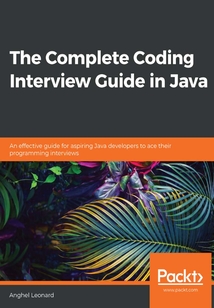舉報 

會員
The Complete Coding Interview Guide in Java
Javaisoneofthemostsought-afterprogramminglanguagesinthejobmarket,butcrackingthecodinginterviewinthischallengingeconomymightnotbeeasy.Thiscomprehensiveguidewillhelpyoutotacklevariouschallengesfacedinacodingjobinterviewandavoidcommoninterviewmistakes,andwillultimatelyguideyoutowardlandingyourjobasaJavadeveloper.Thisbookcontainstwocrucialelementsofcodinginterviews-abriefsectionthatwilltakeyouthroughnon-technicalinterviewquestions,whilethemorecomprehensivepartcoversover200codinginterviewproblemsalongwiththeirhands-onsolutions.Thisbookwillhelpyoutodevelopskillsindatastructuresandalgorithms,whichtechnicalinterviewerslookforinacandidate,bysolvingvariousproblemsbasedonthesetopicscoveringawiderangeofconceptssuchasarrays,strings,maps,linkedlists,sorting,andsearching.You'llfindouthowtoapproachacodinginterviewprobleminastructuredwaythatproducesfasterresults.Towardthefinalchapters,you'lllearntosolvetrickyquestionsaboutconcurrency,functionalprogramming,andsystemscalability.Bytheendofthisbook,you'llhavelearnedhowtosolveJavacodingproblemscommonlyusedininterviews,andwillhavedevelopedtheconfidencetosecureyourJava-centricdreamjob.
目錄(131章)
倒序
- 封面
- 版權信息
- Why subscribe?
- Contributors About the author
- About the reviewer
- Packt is searching for authors like you
- Preface
- Section 1: The Non-Technical Part of an Interview
- Chapter 1:Where to Start and How to Prepare for the Interview
- The novice interview roadmap
- Know yourself
- Know the market
- It’s all about getting the right experience
- Time to write your resume
- The job application process
- I got an interview! Now what?
- Summary
- Chapter 2:What Interviews at Big Companies Look Like
- Interviews at Google
- Interviews at Amazon
- Interviews at Microsoft
- Interviews at Facebook
- Interviews at Crossover
- Summary
- Chapter 3:Common Non-Technical Questions and How To Answer Them
- What is the purpose of non-technical questions?
- What is your experience?
- What is your favorite programming language?
- What do you want to do?
- What are your career goals?
- What's your working style?
- Why are you looking to change jobs?
- What is your salary history?
- Why should we hire you?
- How much money do you want to make?
- Do you have a question for me?
- Summary
- Chapter 4:How to Handle Failures
- Accepting or rejecting an offer
- Failure is an option
- A company can reject you for a lot of reasons
- Objectively identifying and eliminating the mismatches
- Don’t form an obsession for a company
- Don’t lose confidence in yourself – sometimes they don’t deserve you!
- Summary
- Chapter 5:How to Approach a Coding Challenge
- Technical quiz
- Coding challenge
- Summary
- Section 2: Concepts
- Chapter 6:Object-Oriented Programming
- Technical requirements
- Understanding OOP concepts
- Getting to know the SOLID principles
- Popular questions pertaining to OOP SOLID and GOF design patterns
- Coding challenges
- Summary
- Chapter 7:Big O Analysis of Algorithms
- Analogy
- Big O complexity time
- The best case worst case and expected case
- Big O examples
- Key hints to look for in an interview
- Summary
- Chapter 8:Recursion and Dynamic Programming
- Technical requirements
- Recursion in a nutshell
- Dynamic Programming in a nutshell
- Coding challenges
- Chapter 9:Bit Manipulation
- Technical requirements
- Bit manipulation in a nutshell
- Coding challenges
- Summary
- Section 3: Algorithms and Data Structures
- Chapter 10:Arrays and Strings
- Technical requirements
- Arrays and strings in a nutshell
- Coding challenges
- Summary
- Chapter 11:Linked Lists and Maps
- Technical requirements
- Linked lists in a nutshell
- Maps in a nutshell
- Coding challenges
- Summary
- Chapter 12:Stacks and Queues
- Technical requirements
- Stacks in a nutshell
- Queues in a nutshell
- Coding challenges
- Infix postfix and prefix expressions
- Summary
- Chapter 13:Trees and Graphs
- Technical requirements
- Trees in a nutshell
- Graphs in a nutshell
- Coding challenges
- Advanced topics
- Summary
- Chapter 14:Sorting and Searching
- Technical requirements
- Sorting algorithms
- Searching algorithms
- Coding challenges
- Summary
- Chapter 15:Mathematics and Puzzles
- Technical requirements
- Tips and suggestions
- Coding challenges
- Summary
- Section 4: Bonus – Concurrency and Functional Programming
- Chapter 16:Concurrency
- Technical Requirements
- Java concurrency (multithreading) in a nutshell
- Questions and coding challenges
- Chapter 17:Functional-Style Programming
- Java functional-style programming in a nutshell
- Questions and coding challenges
- Summary
- Chapter 18:Unit Testing
- Technical Requirements
- Unit testing in a nutshell
- Questions and coding challenges
- Summary
- Chapter 19:System Scalability
- Scalability in a nutshell
- Questions and coding challenges
- Practicing is the key to success
- Summary
- Other Books You May Enjoy 更新時間:2021-06-11 18:25:41
推薦閱讀
- GeoServer Cookbook
- Mastering OpenCV Android Application Programming
- Mastering Entity Framework
- Animate CC二維動畫設計與制作(微課版)
- Internet of Things with the Arduino Yún
- Mastering JavaScript High Performance
- 用戶體驗可視化指南
- 智能搜索和推薦系統:原理、算法與應用
- SQL Server 2008 R2數據庫技術及應用(第3版)
- JavaScript機器人編程指南
- Arduino機器人系統設計及開發
- ASP.NET開發寶典
- 趣學數據結構
- Cloud Development andDeployment with CloudBees
- 面向物聯網的Android應用開發與實踐
- HTML5 and CSS3:Building Responsive Websites
- Instant SQL Server Analysis Services 2012 Cube Security
- Web前端開發全程實戰:HTML5+CSS3+JavaScript+jQuery+Bootstrap
- Mastering PyCharm
- C#多線程編程實戰
- Instant MongoDB
- Netty、Redis、Zookeeper高并發實戰
- Excel VBA活用范例實用手冊(暢銷升級版)
- 零基礎學交互設計
- Microsoft Tabular Modeling Cookbook
- 餐飲管理與經營全案:互聯網思維創新餐飲管理和運營模式
- HoloLens 2開發入門精要:基于Unity和MRTK
- C#從入門到精通
- Unity 2020 Virtual Reality Projects
- shell腳本基礎教程

